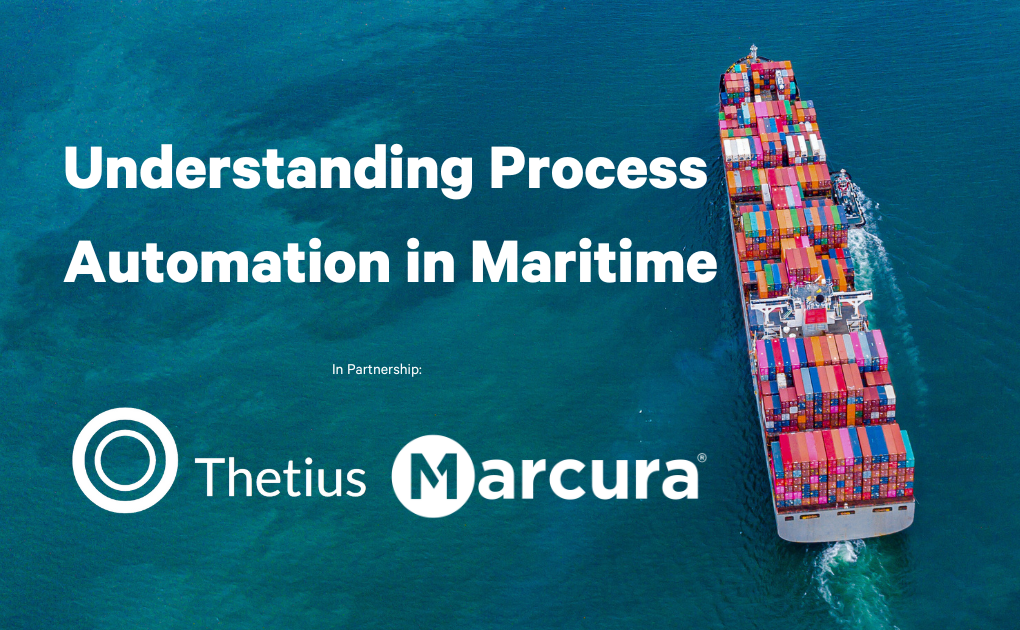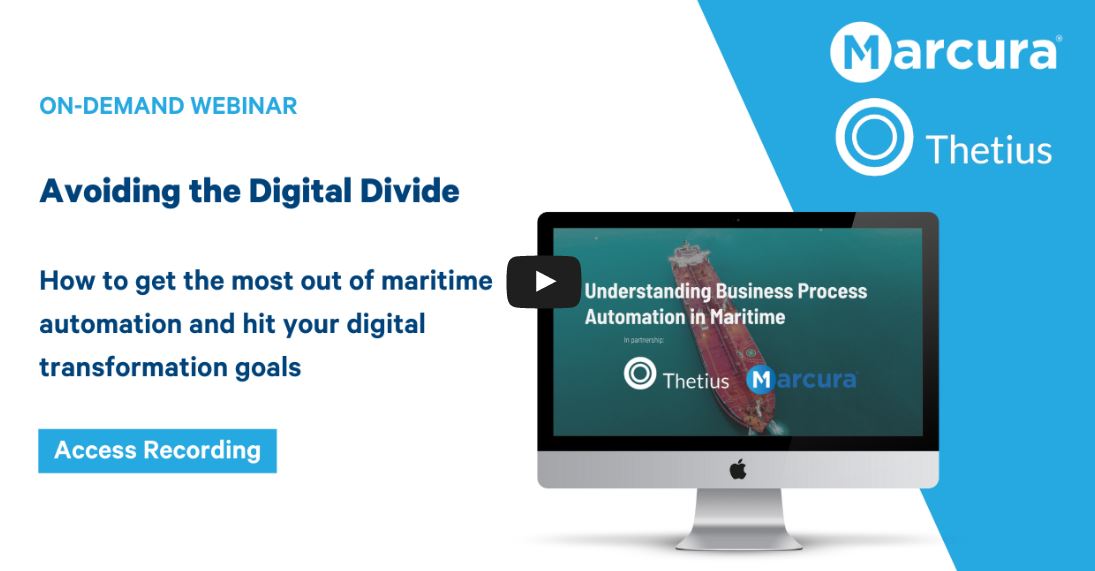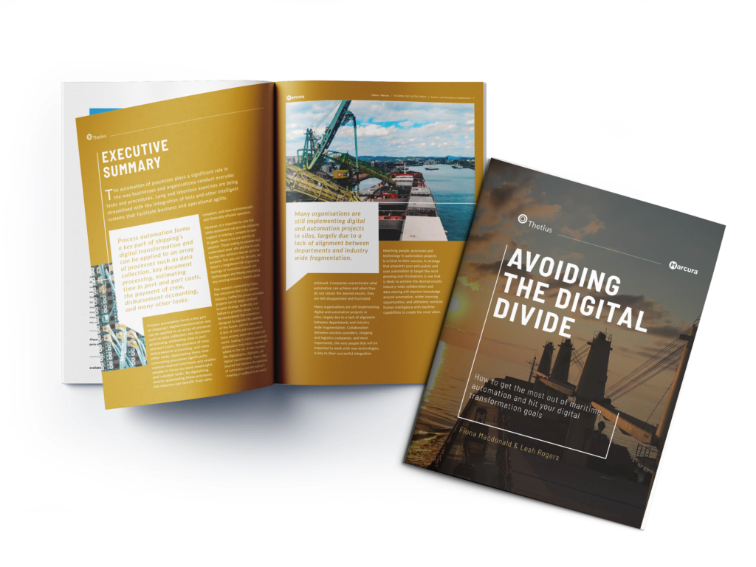
Six useful insights for successful maritime process automation
Six useful insights for successful maritime process automation
The maritime industry is in the midst of a technological revolution, with businesses looking to adopt automation and digital tools and processes to increase efficiency, reduce costs and ensure regulatory compliance. Our recent eBook “Avoiding the Digital Divide” found that 80% of maritime businesses see process automation as a key driver for continued growth.
To explore the impacts and key considerations of process automation in more depth, our Group Chief Commercial Officer, Hans-Christian Mordhorst, joined a recent Thetius webinar on “Understanding process automation in maritime“ to delve into the priorities and possible pitfalls of automation.
Here, we’ve gathered some of his key takeaways and most valuable insights to help you successfully navigate your own process automation journey.
1. What are the main opportunities and concerns around process automation in maritime?
Marcura is a company that was founded 20+ years ago with a view to achieve efficiency, empower knowledge workers to have more job satisfaction and focus on what’s really important. As far as process automation is concerned, it’s ingrained in how we work.
Automation supports scalability, it removes errors, but it’s actually human-centric, in two ways.
Firstly, and most importantly for our customers, whatever automation we’re able to achieve for them, they stay in control. They want to be able to understand what is happening – “who am I appointing as an agent?”, “What is my cost going to be?”.
Secondly, it [automation] isn’t primarily about eliminating jobs, but rather making them more fulfilling, focusing on how knowledge workers in the maritime industry can do a better, and more meaningful job.
2. Why do businesses embark on the automation journey?
As Stephen Covey would say, you start with the end in mind. As a CXO in a company, or head of an automation department, ask yourself: “what are you actually trying to achieve?”
It might be that the board of directors have said “We need to see this company do some kind of automation initiatives!”, but more frequently the successful transformations that we observe spring from clear goals:
- Do we want to make our business more scalable?
- Do we want to be able to use data across multiple processes?
- Do we want to save cost?
I also need to come back to employee satisfaction. In many parts of the shipping industry, making sure that people want to stay, and want to join our industry, is not a given. Particularly when you look at younger generations, they don’t expect to sit and do repetitive – and not really meaningful – tasks over and over again.
After answering your question “What are we trying to achieve?”, you then come to: “Should we build, or should we buy?”
As alluded to in the report, one of the big challenges is that you don’t have data standards in the maritime industry. If your purpose is only to automate for yourself, without ambitions to integrate with counterparties, then building is an option.
If you want to be part of a larger ecosystem, and invite your customers or your suppliers in. It’s a totally different story.
3. What kind of problems can be solved by implementing process automation?
I think laytime calculations are a great example for what process automation can do when you also consider your full ecosystem.
Any voyage will have the same Laytime calculation done by multiple parties.
Whilst someone may have a level of automation, the shipper, the charterer, the trader, the receiver… they all have to look at the same voyage of cargo moving from A to B.
Then they all have accruals, estimates, their actual calculations, they need to agree with counterparties whether everything is fair and correct, according to the charter party…
I think that’s a really illustrious example of how that lack of standards and connectivity between these parties is just creating a lot of extra work, upstream and downstream on any commodity voyage.
4. How can businesses introduce process automation while ensuring continuity of services?
You have to invest quite heavily upfront. As a service provider to the industry, we know we can do this on behalf of many customers, current and future. So I would say it’s important to partner up so you don’t have to do all the heavy lifting whilst also ensuring continuity of service.
Let’s take an example: when it comes to payments, the whole sanctions landscape, and counterparty due diligence, how you support what different systems tell you… What about all the false positives? What about all the changes that happen overnight?
It’s a massively complex landscape from a compliance perspective, and it’s exacerbated by the fact that you have multiple links in a payment chain.
I think that goes way beyond process automation. You can’t just automate this. So actually, what we typically go to our customers with, is that it’s not just about automating the process, it’s about elevating it.
It is really about building additional protective layers around our customers, funds and processes.
5. How can we ensure that operators and employees across the industry are engaged proactively with new technology and automation?
Whether you’re on the commercial side, chartering side, operations, or post-fixture, this is knowledge work. Help them realise and internalise that.
Companies learn from mistakes, just like we do as individuals, and these can be expensive mistakes, so you don’t want to repeat them. Which means ideally, you would like to hang on to those knowledge workers for as long as possible.
But you also want to find ways to codify the knowledge, so if somebody wins the lottery and walks out the door, you don’t lose 15 years of experience right there and then.
So, capturing knowledge is not a risk to the knowledge workers today, but on the contrary, actually future-proofs the company.
I think that’s an important theme that we hear from our customers in terms of job satisfaction. Post-pandemic, we’ve probably all gotten used to a level of flexibility that is hard to take away. If you have automated processes and you have been able to achieve some level of digital initiatives, that means you don’t need to sit together physically in the office to do your work effectively.
6. To what extent can we expect the IMO maritime single window 2024 to help standardise data in the maritime supply chain?
I hope for the best, but it would be wrong to hang our hats only on the regulators ability to implement global standards.
While it’s right about the single window and trying to promote ‘just-in-time’, or optimal time of arrival, and virtual NOR’s, I think we in the private sector need to work in parallel to it.
So I think it’s good what the IMO is doing, but I think it would be unfair to expect them to completely transform the industry.
Key takeaways:
Have a clear goal in mind before you begin
Technology is simply a tool to enable people and will not solve existing issues on its own. Make sure you have a clear reason and a measurable end-goal in mind before automating a process.
Be empathetic
By looking for the pain points in the day-to-day roles of employees and customers, and addressing those as a priority, you will increase early-stage buy-in for automation. And consider your people knowledge workers.
Patience is key to success
Successful automation, digitisation, and digital transformation is all about small steps. To improve processes, businesses should not look for massive disruption, but instead meet people where they are, grow trust and make small, iterative improvements.

If you’d like to know more, make sure you check out the full webinar for additional insights from a panel of experts from Marcura, Maindeck, Midship and EY.
Read our research report “Avoiding the Digital Divide”.

